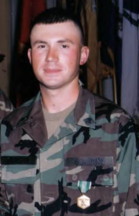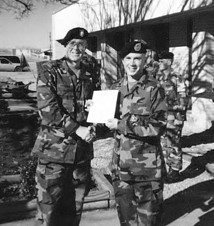|

|
Why
we fight
by
Pepe Johnson
|
Everyone
has a story. And every story is unique. Here at MEA we want to empower the individual to share his
or her story about why Donít Ask, Donít Tell
doesnít work. For veterans that often means
sharing honestly about how they served in the U.S.
military with skill, courage and honor. But not
all of our activists are veterans. Many MEA
supporters believe in individual liberties and
that a restriction against the personal conduct of
servicemembers off-duty are unnecessary
limitations on their freedom. Some MEA activists
are the spouses of active duty servicemembers and
they speak for those who serve in silence. No
matter what, every individualís story is unique.
Like the strands that form a rope, together our
stories are stronger and provide compelling
arguments to end discrimination based on sexual
orientation.
Today I
would like to share my story and I challenge my
fellow MEA supporters and activists to do the
same. Surveys and studies and statistics all
provide logical reasons to end Donít Ask, Donít
Tell, but our humanity turns those statistics into
truly meaningful information.
In the summer of 1999 I
enlisted in the US Armyís Delayed Entry Program.
I waited anxiously to leave for basic training in
January 2000. Since I was big enough to walk, I
had been fascinated by the military. Both of my
grandfathers had served in World War II and my
uncle in Vietnam. Numerous other family members
had served as well and my motherís family tree
was strongly rooted in the Sons and Daughters of
the American Revolution. Our house was filled with
military memorabilia including uniforms and
posters from World War I. Now it was my turn to
serve America in uniform.
Basic Combat Training at
Fort Sill, Oklahoma, was uneventful and like
everyone else I was homesick and frustrated and
tired, but I finally graduated. I was a 13B Ė
Field Artillery Cannon Crewmember Ė and assigned
to stay at Fort Sill. My unit supported training
activities and we fired more rounds in a month
than most artillerymen would fire in their entire
career. I participated in competitive boards and
was first selected as Battalion Soldier of the
Month, eventually I competed for and was selected
as the Fort Sill Soldier of the Year in 2001. I
made sergeant with less than two years active
federal service.
Throughout this time, I
was wrestling with myself about my sexuality. Deep
inside me I knew that I was gay but I had trouble
coming to terms with that reality. I prayed and
studied the Bible hoping God would turn me
straight. Then I came to understand that being gay
is simply who I am Ė part of a complex
individual. I had not chosen to be gay, but I had
to choose whether I would continue to fight with
myself or whether I would cope and learn to live
in my own skin. I did cope and I learned to hide
myself during duty hours and only relaxed when I
was away from post.

Change is the only
constant when it comes to life in the military. My
battalion and battery received several new leaders
in a very short time. Leaders set the climate for
their unit and a lot of new leaders creates a lot
of change. I wanted to make the Army my career
because I enjoyed my work, I enjoyed the
camaraderie and I felt called to be a soldier. I
thought I could live under the Donít Ask, Donít
Tell policy Ė I didnít want to make my
personal life a subject of controversy. But the
changing climate in my unit made me realize that I
couldnít live under such a policy for long.
My commander would stand
in front of formations making motivational
speeches. Looking for laughs, he would throw in
some jokes he thought were funny. He included some
jokes that were aimed at making fun of gay people.
At first I wasnít bothered and ignored them.
Then gay jokes become the only jokes he told and
he told them everyday. Then he turned them into
threats advising us he had better not find anyone
like that in his unit. The new first sergeant was
worse Ė his comments going beyond perverse. He
constantly reminded us about the size of his
genitals and offered to let us experience it
firsthand, even providing us with truly graphic
details about how it would happen. Not only did I
feel uncomfortable, but some of my soldiers
approached me asking me to do something about the
first sergeantís behavior.
I didnít know where to
turn. I was bothered about the situation and so
were my soldiers. I didnít think that it was a
case for sexual harassment, but looking back maybe
it really was. I couldnít stand it anymore. I
couldnít deal with the existing situation and I
didnít see any transfers coming along soon. As
an undermanned training unit, we werenít going
to be deployed any time soon. I thought I could
make a change by exposing the ridiculousness of
their stereotypes and harassing behavior. They
celebrated me and recognized me for being the
"soldier of the year" over and over
again. Sometimes I wished I had never won because
of all the attention I received. But, I thought to
myself, maybe I could use that notoriety to show
them what gays and lesbians are actually capable
of.
My friend, a straight NCO
in another unit, went with me when I turned in my
statement to my commander. I am eternally grateful
to him and to everyone else in my own "band
of brothers" who stood by me throughout the
investigation and discharge. One of my soldiers
was on his honeymoon when he heard about the
investigation. He called me to find out what was
going on and told me he would tell the commander
what he thought about the investigation when he
got back.
My idea to expose the
harassment and discriminatory behavior in my unit
did not work as I had hoped. The first sergeant
now had someone to direct his anger at and
constantly played games with me by giving me
conflicting instructions that made me run around
like a private in basic training. He even ordered
me to be escorted throughout the discharge process
"just in case [I] got any ideas." Oddly
enough the NCO assigned to escort was junior to me
and had just been re-promoted following a DUI. He
even admitted that I should be escorting him if
you examined our records closely.
I never understood what
"ideas" the first sergeant thought I
might get. But after being discharged, I did get
several ideas Ė and they were about fighting Donít
Ask, Donít Tell. As a veteran I am no longer
held in silence and can speak out about my
experiences. I can also actively oppose Donít
Ask, Donít Tell and advocate for change. I
relocated to Dallas, Texas, and now take part in
the Military Equality Alliance. I havenít given
up on my dream of being a career military officer,
but I recognize that no career is worthy of losing
my personal dignity and liberty. I am still young
enough to return to the military when Donít Ask,
Donít Tell is gone so hope truly springs
eternal. I am willing to risk my own life in
defense of liberty, but I will never surrender out
of fear and I will never surrender my own liberty.
|
![]()